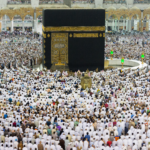The masjid was quiet now. The rows that once overflowed with worshippers had thinned. The suhoor alarms had stopped ringing, and the rhythm of taraweeh was gone.
Khadijah sat on the edge of her prayer mat several weeks after Eid, her Qur’an still beside her. But somehow, she hadn’t opened it since the takbeerat faded. Her heart felt… heavy.
She couldn’t quite explain it—this hollow, aching quiet.

Ramadan had left like an old friend, and it hurt more than she expected.
Just some weeks ago, her days had been soaked in barakah. The stillness of pre-dawn Qur’an recitation, the sweetness of iftar with loved ones, the spiritual high of heartfelt du’as in the depths of the night—all of it had filled her soul.
But now?
She was struggling to wake up for fajr. Her phone called to her more than her prayer beads. And every time she tried to recapture the Ramadan glow, she found herself scrolling instead.
Was it all just temporary?
One afternoon, she messaged Maryam.
“I miss Ramadan.”
“Me too,” her friend replied. “It’s like my heart knew it was a guest… but forgot how much I’d miss it when it left.”
That one sentence struck Khadijah like a soft lightning bolt. She wasn’t alone.
She realised what she was experiencing had a name: Post-Ramadan Blues. That quiet grief that settles in when the intensity of Ramadan fades and life creeps back in with its noise and distractions.
But maybe—just maybe—this sadness wasn’t a sign of failure. Maybe it was proof that something inside her had changed.
Holding Onto the Glow
That night, she made a cup of tea, lit a soft lamp, and sat with her journal. This time, she wasn’t writing goals. She was writing love notes to her Ramadan self.
“I loved how calm you felt after every fajr.”
“I’m proud of how you whispered du’a even when you were too tired to speak.”
“I saw you push past exhaustion to open the Qur’an. Allah saw it too.”
And then she wrote: “Let’s not let her go.”
Khadijah didn’t try to do everything at once. She started with one small act: waking up ten minutes before fajr for quiet reflection. No pressure. Just presence.
She kept giving—even if it was a single naira in charity. She kept connecting—even if she could only read a verse a day.
She stopped chasing the Ramadan pace and started preserving the Ramadan peace.
It wasn’t about duplicating the month. It was about carrying its fragrance into the months that follow.
Dear Sister, if you feel the blues too…
You’re not alone. This ache in your chest? It means your soul tasted something real.
So here’s how to gently navigate the post-Ramadan dip:
- Don’t aim for perfection—aim for presence. Pick one small act of worship and commit to it daily. One verse, one prayer on time, one quiet dhikr on your walk.
- Schedule your soul time. If Ramadan taught you to make time for Allah, continue that habit—even if it’s just ten minutes a day.
- Reconnect through community. Find a halaqah, a WhatsApp circle, or even a weekly reminder with a friend. Don’t let your journey be solitary.
- Anchor your mornings. The barakah of starting your day with fajr and quiet dhikr will ripple through everything else.
- Make du’a like you did in Ramadan. Allah’s door didn’t close after Eid. He’s still near, still listening, still waiting.
And most of all—be kind to yourself. This journey isn’t about sprinting. It’s about returning. Again. And again. And again.
As Khadijah folded her prayer mat the next day, she smiled softly.
Ramadan was gone. But what it planted in her heart was still growing.
And she would water it—one small, sincere act at a time.


